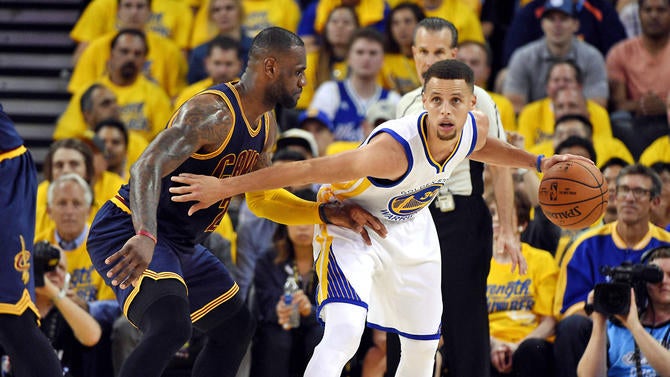OAKLAND, Calif. -- The worst sleep LeBron James has ever had in his 13 years in the NBA was in the aftermath of the 2011 Finals. James had joined Dwyane Wade and Chris Bosh in Miami to form a super team that was destined to win "not one, not two, not three ..." championships, and so on.
It was going to be "easy," LeBron said. But on their first try against the Dallas Mavericks, the Big Three swung ... and missed.
"I just felt like sleep wasn't important and the only thing that mattered to me was how I was going to try to get back up there and win," James told CBS Sports. "It was very difficult to get sleep, because my mind was racing so much that it didn't allow me to go at ease.
"This game right here," he said, "it does stuff to your mind, man."
So does sleep deprivation, which has become a way of life in the NBA.
Eighty-two regular-season games. Back-to-backs. Four games in five nights. Crisscrossing multiple time zones. NBA players are paid millions of dollars to push the limits of human performance, only to neglect the simplest and most effective tool.
Until now.
"Sleep is the most important thing when it comes to recovery," James said. "And it's very tough with our schedule. Our schedule keeps us up late at night, and most of the time it wakes us up early in the morning. ... There's no better recovery than sleep."
Scientists are in agreement that even one sleepless night is the equivalent of having a few alcoholic drinks; 22 hours without sleeping has been shown to cause cognitive and reactive impairment comparable to being legally drunk.
In the NBA, trainers, coaches and the billionaires who pay millionaires to play basketball for them are only now beginning to realize how poor sleep habits can devastate performance and perhaps even affect longevity and injury rates. They can be damaging to the bottom line, too.
One sports performance expert who has consulted with the NBA said the cost of a star player suffering a significant injury is close to $100 million when factoring in lost ticket revenue and merchandise sales.
"Keeping those players healthy and keeping them visible is critical to this league," the person said.
And basketball players are not alone.
From military combat forces to high-octane executives and working parents, sleep deficit is an epidemic. In the general population, it has been linked to higher rates of illness, disease and obesity, as well as declines in cognitive function and job performance. For NBA players, research is beginning to show correlations between sleep debt and statistical production, and some studies have begun to connect the dots between sleep and injury rates.
"People are living beyond their means in terms of sleep," said Jason Donahue, sleep specialist for Jawbone, whose wrist-mounted sleep tracker is among a growing inventory of wearables helping the Golden State Warriors (and weekend warriors) monitor and improve their sleep habits.
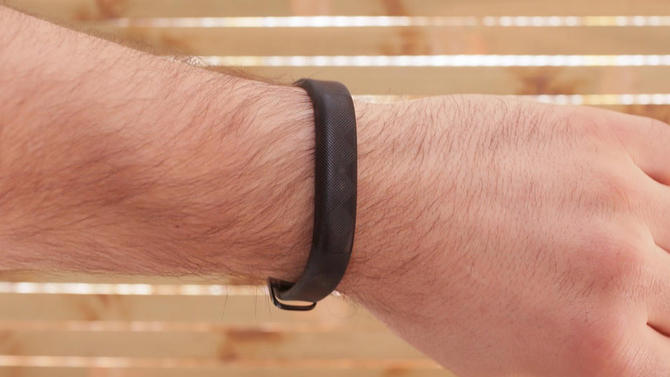
The breakthrough study was a 2011 trial led by Stanford's Cheri Mah, one of the world's top experts on the effects of sleep on sports performance. Over several weeks, the nightly sleep of 11 Stanford men's basketball players was increased, with a goal of spending 10 hours per night in bed. At the end of the trial, faster sprint times were recorded, and free-throw accuracy increased 9 percent while 3-point accuracy improved 9.2 percent.
Long-term effects of sleep debt on athletes have been documented, too. A 2010-12 trial involving 80 Major League Baseball players from three teams led by Christopher Winters of the Martha Jefferson Hospital Sleep Medicine Center in Charlottesville, Virginia, showed a correlation between daytime sleepiness and career longevity. Over the three-year period, 72 percent of players reporting lower levels of sleepiness were still in the league, compared to 39 percent of those reporting to be twice as sleepy and 14 percent of those with Epworth Sleepiness scores that were three times as high.
"Start 'em young" is what parents say about kids and sports, but it's true with sleep, too. In a 2014 study involving 160 middle school athletes by the Journal of Pediatric Orthopedics, those who slept less than eight hours per night were 1.7 times more likely to have an injury than those who slept for eight hours or more.
"Of course, on the basketball side, you have to fine tune your skills," Thunder forward Kevin Durant told CBS Sports. "But on the other side, you have to fine tune your body. There's a lot of remedies you can use as a basketball player to get better, but the easiest thing you can do is go to sleep."
But how are you supposed to get the restorative sleep that is required for tissue repair, muscle growth, recovery, mental sharpness and decision-making when you're crossing time zones, arriving at the team hotel at 3:30 in the morning and have a game the next night?
"I never sleep on flights for that reason," Pacers All-Star Paul George told CBS Sports. "I try to save it, try to fight it regardless of how far we're going."
With an increased emphasis on player health under commissioner Adam Silver, the NBA has begun to take notice. This season, league schedule-makers reduced the number of back-to-back games per team from 19.3 in 2014-15 to 17.3, and they also trimmed the overall instances of four games in five nights by 61 percent. A longer All-Star break has been squeezed into the schedule, and the Finals have been spread out over more off days to allow for better rest and recovery, and to minimize the impact of travel on the players. The league also cut the total amount of miles traveled per team by 2 percent this season; when you're logging as many miles as NBA players do, that's significant.
Funny, it seems tired, jet-lagged players don't put on a very good show. And in the eternal quest for any competitive advantage, teams are deploying their own army of sports scientists and performance experts to confront their most formidable opponent -- the sleep monster.
After winning their first championship in 40 years last season, the Golden State Warriors restructured their athletic training department. Director of athletic performance Keke Lyles, who was ahead of the curve in his use of wearable technology to monitor player fatigue, got an offer he couldn't refuse to join the Atlanta Hawks and form his own dream team of performance experts.
Enter Lachlan Penfold, a buzz-cut Aussie who has worked with Australian Rules football players, rugby players and various Olympians, as the Warriors' director of physical performance and sports medicine.
His experience with elite athletes and their typically atrocious sleep habits led him to focus there first. He consulted with Stanford's Mah to optimize the team's flights and practice schedules and came up with a to-do list for players to improve their sleep hygiene.
Some of it is simple stuff that any Average Joe or Jane struggling with the debilitating effects of sleep debt can implement: turning off the screens an hour before bedtime, avoiding inflammatory foods, and making sure the sleeping environment is dark, peaceful and temperature-controlled; 68 degrees or cooler seems to work best. Caffeine and alcohol should be avoided, though given his clientele, Penfold knew he'd have to pick his battles on that front.
Oftentimes, a player who isn't initially interested in improving his sleep strategies comes back to Penfold after an injury or a poor stretch on the court.
"There's an old saying," Penfold said. "When the student is ready, the master will appear."
Stephen Curry, the masterful, two-time reigning MVP, was ready for such an intervention. Curry and teammates Harrison Barnes and Festus Ezeli are among the Warriors players who've taken Penfold up on a very hipster solution: visiting a Bay Area studio that offers desensitizing flotation baths to enhance recovery and sleep quality.
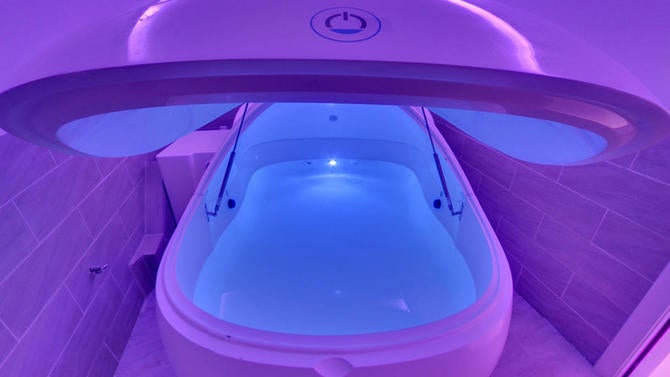
At Reboot in San Francisco, Curry climbs into a float tank, or pod, filled with water spiked with loads of magnesium sulfate; the high concentration of Epsom salt makes the player weightless and is absorbed through the skin to help reduce tissue soreness. The pod, which is what would be born if a kiddie pool and a Lamborghini had a baby, blocks out all outside noise.
Among believers -- and you can count Curry in -- it's the puddle of youth.
"You just get refreshed and recharged," Curry told CBS Sports. "Just an hour or an hour-and-a-half of just you and your thoughts. You don't get that many opportunities to get unplugged from every outlet in your life."
Curry tries to visit the float tank every two weeks or so when the Warriors are home. A father of two, he finds that he sleeps better on the road, where there are fewer distractions. He was not able to squeeze in a session between Games 1 and 2 of the Finals, he said Sunday.
"When they go home," Penfold said, "most of the time they'll tell me it was the best sleep they've had in ages."
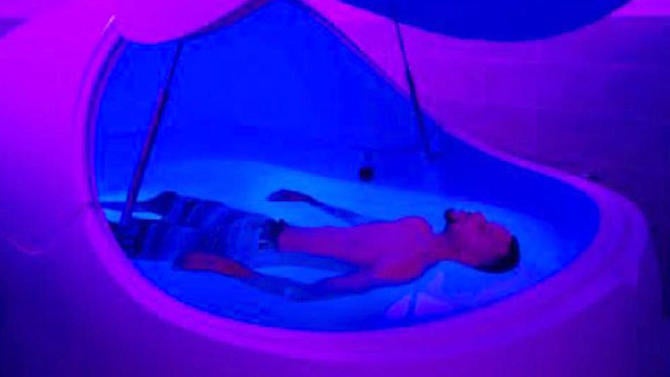
Curry's teammate, Andre Iguodala, hasn't tried the float tank yet. But when he came to the Warriors in a sign-and-trade in 2014, he was floating helplessly through his basketball career with a long history of sleep disorder.
It started way back during his two years at the University of Arizona, when he developed a habit of taking long naps on game days, staying up until 3 or 4 in the morning because he was so hyped from playing and waking up early for class or practice. It created a vicious cycle he was unable to break for years.
He started using a wearable device from Jawbone that monitored the length and quality of his sleep and gave him feedback on how to improve his bedtime routine. One of the first things he did was remove the TV from his bedroom. Airplane mode on his cell phone wasn't just for airplanes anymore.
Iguodala gave Jawbone permission to analyze his data this season, and the results were stunning -- with the graphic below illustrating Iguodala's increased production in games following a night of more than eight hours sleep.
"Once you start getting six hours, you start getting seven hours," said Iguodala, the 2015 Finals MVP. "Then you just constantly get in a rhythm and build it."
Gary McCoy, senior vice president of applied sports science at WHOOP, a Boston company that is revolutionizing sleep trackers, has seen similar results. When McCoy started digging into the data collected from 119 NCAA Division I athletes wearing the company's device from September 2015 to January 2016, he was blown away.
A WHOOP is a wristband with five sensors sampling biorhythms 100 times per second. It reports a recovery score every morning based on heart-rate variability and other data points collected throughout the day and during sleep. A score of 66-100 is "green," meaning the athlete is properly recovered and ready to train or compete. The 33-66 range is "yellow" -- the tank is getting low -- and 0-33 is "red." That's empty.
The athlete also receives a series of morning questions in the app related to pre-sleep habits, such as how much caffeine or alcohol the athlete consumed and whether he or she used a screen device before bedtime.
What McCoy's team found was that athletes wearing the device were actually changing their behavior. They were averaging 41 minutes more sleep per night. Reported alcohol consumption declined 70 percent, and caffeine 65 percent, McCoy said.
"Screen time only declined 20 percent," McCoy said, "but that was a win."
During the 129-day study, the athletes reported 60 percent fewer injuries and 54 percent less sickness. And their resting heart rates dropped by 4.4 beats per minute on average, a sign of increased cardiovascular capacity and lower stress. As for performance, here are the numbers of one NBA player that WHOOP tracked over a 24-game period. It's a small sample, sure, but you can see the benefits of waking up with a high recovery score as compared to a low one.
| | Low | High |
| Assists | 3.5 | 8 |
| Turnovers | 5 | 1 |
| Points | 18.5 | 21.3 |
| FG % | 35 | 51 |
WHOOP has four NBA teams using its technology, with inquiries from 15 more, McCoy said. The company recently met with NFL and NBA teams at their draft combines, and is on the verge of its most ambitious study yet involving 24 Major League Baseball teams.
WHOOP is the device that Cavs guard Matthew Dellavedova was caught wearing in a game this season, which is against NBA rules. As the league and National Basketball Players Association continue to negotiate a new collective bargaining agreement this summer, the use and parameters for wearable technology will be paramount in the discussions -- as will players' privacy rights when it comes to the data collected. Who owns it? What can it be used for?
"We can adjust the privacy settings by the individual athlete," McCoy said. "And we have the same data security as the CIA and Amazon. But if somebody could hack LeBron James' data and say, 'Shit, we better not bet on the Cavs today because LeBron James is red,' that's a problem."
Also, imagine a team deciding not to offer a player a max contract because it got access to data showing how sleep deprived - and thus, perhaps injury prone -- he is.
"We don't want it to end up as a pawn in the game of negotiation," McCoy said.
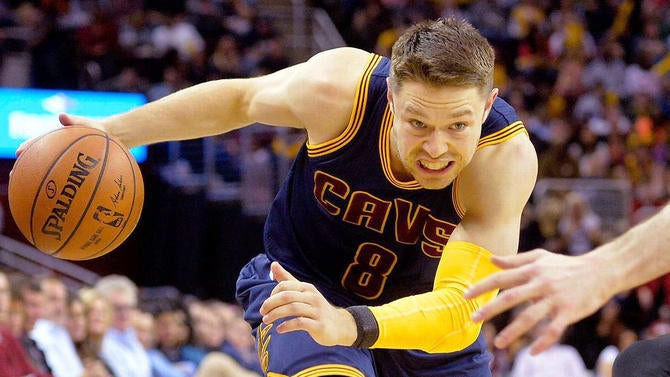
But the value of coaches and team executives knowing how recovered their athletes are on a daily basis is exceedingly powerful, as McCoy explained to an NFL head coach during a recent pitch meeting.
"When you get in the car and drive to the practice facility, the first thing you do is look at the fuel gage to see if you have enough gas to get to work," McCoy said. "This is the question we're asking every time we see an athlete's recovery score. You know how much gas is in the tank when he gets there."
There are other devices in the exploding wearables market, such as Sleep Rate, which San Jose Sharks strength and conditioning coordinator Mike Potenza has used with his players, and the Lark, which Barnes has used to improve his sleep habits.
But when it comes to the powerful benefits of sleep -- and the catastrophic consequences of sleep debt -- sometimes, high performers need more than data.
Like Kirk Parsley, they need a wakeup call.
Parsley is a former Navy SEAL who went to work as the special forces unit's physician in 2009. Young and seemingly healthy combat buddies started coming to him with a host of disturbing complaints and symptoms -- cognitive disruptions, strength declines, depression, anger issues, body composition changes and sex-drive problems.
"These guys' blood chemistries came back looking like fat, broken 70-year-old men, even though to look at them they were still fairly young and fairly fit," Parsley said. "It didn't fit."
Parsley researched adrenal fatigue, which he suspected as the cause since many of his patients had just completed years of deployment in the Middle East. The more he learned, the more he realized how critical the body's production of testosterone and growth hormone is to healthy adrenal function -- and that those hormones are chiefly secreted during sleep.
He dug deeper.
Many of his patients revealed that they weren't sleeping well; some had been prescribed sleep-aid drugs, such as Ambien. Sleep deprivation is not only a reality, but a necessity of being a SEAL. Special forces often train for hours or even days at a time with no sleep to simulate combat situations, Parsley said.
"There's a reason we use sleep deprivation as a way to break people down for interrogation," Parsley said. "The fastest way to break somebody is to deprive them of sleep."
Thus, Parsley became one of the first medical doctors in the country to discuss sleep as a performance-enhancer and non-pharmaceutical treatment for disease. Based in San Diego, he's now known as the Sleep Doctor, delivering TED Talks, podcasts and speeches on his favorite topic.
"If you can show me some clinical data where anybody has ever performed better on less than what we think is the idealized version of sleep for an adult, I'm willing to retract everything I've ever said," Parsley said. "But there is no research that shows this. ... There's not a single metric that anybody would ever measure their life by that isn't dramatically affected by sleep."
He coached his SEAL patients on improving sleep hygiene and diet, recommended supplements like magnesium, Vitamin D and tiny amounts of melatonin, and got them off the sleep drugs. He began seeing their testosterone levels skyrocket by an average of 300 percent, with some patients increasing as much as 500 percent, he said.
"Sleep deprivation leads to increased stress," Parsley said, "and increased stress leads to increased sleep deprivation. The research goes on forever."
While playing in the NBA is hardly equivalent to military combat, some of the same macho ideas about sleep exist in both worlds. The feeling of invincibility leads some stars to believe that they're so talented they can compress eight hours of sleep into four hours and get the same benefit. Folk stories of Michael Jordan gambling all night and then dropping 50 still circulate around NBA locker rooms.
"We live in a culture that doesn't value sleep," Parsley said. "It's often associated with laziness, lack of motivation, all sorts of negative connotations for somebody who sleeps excessively -- and all sorts of accolades and idolization for people who claim to sleep three or four hours a night. You have to get past that prejudice."
Durant, for example, said he only gets about six or seven hours a night and believes that's enough. He's wrong; that's not even enough for a basketball writer, much less a basketball player. Whereas physically restorative deep sleep occurs early in the sleep cycle, REM sleep, when you dream, occurs in the latter stages and is necessary for cognitive repair and decision-making.
"If you don't sleep for a long enough period, you might get the majority of deep sleep, but there's no way to get REM sleep," Donahue said. "This is where we learn our playbooks, remember who to pass to when you have two seconds left, remember the play that was just drawn up and stay cool under pressure."
In the sleep-deprived NBA, though, players need more than science and lectures. They need experienced coaches who are knowledgeable about the role of sleep in recovery and who have the training and skills to change behavior.
That's where people like Arnie Kander come in. The longtime trainer of the Detroit Pistons and, most recently, with the Minnesota Timberwolves -- until new coach and president Tom Thibodeau cleaned out the entire basketball staff -- Kander is the NBA's sleep whisperer.
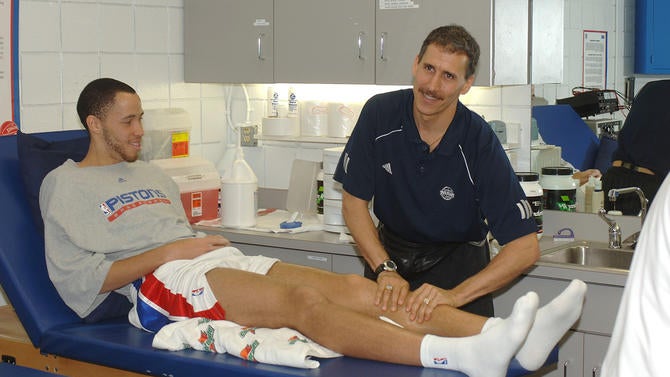
Some may consider his methods to be unorthodox; during the Pistons' run to six consecutive Eastern Conference finals and the 2004 NBA title, Kander once got Chauncey Billups through an entire postseason by treating his debilitating knee tendinitis with frozen banana peels.
(As an aside, I've tried it; it works.)
In addition to the agreed-upon remedies like having a cool, dark room to sleep in and turning off the electronic gadgets before bedtime, Kander advises his players to avoid inflammatory foods (such as those containing trans fats or those fried in toxic, hydrogenated oils). He's also traveled with wooden boards to firm up mattresses for certain players and had customized pillows made for others. This past season, Ricky Rubio was one of Kander's most attentive sleep students, he said.
You sleep better when your body temperature remains low, so Kander tells players to untuck the bed sheets before falling asleep; something as seemingly harmless as having your ankles trapped under the sheets can cause you to toss and turn, raising your body temperature, he said.
In hotels, Kander inspects the air vents for dust and looks in the bathrooms for mold and other irritants.
"I'm looking for literally anything in a room that could harm your sleep so your body's not fighting off something," he said.
Potenza, whose Sharks are in the Stanley Cup Finals, also is a believer in home remedies, such as specially designed sheets that minimize static electricity and chill mats to keep body temperature down. He recommends chamomile and lavender teas and oils before bed, as well as tart cherry juice, which has anti-inflammatory properties and naturally occurring melatonin, which helps the body and brain relax.
"It's an entertainment schedule, not a sports schedule," Potenza said. "Eighty-two games is quite a lot. We're winding them up at night, and then we have to find a way to wind them down."
Naps are key, as long as they're not more than an hour or two so as not to disturb the natural nighttime sleep rhythms.
"This may sound weird to you," said James, who aims for 8-9 hours of sleep a night, "but for my 13-year career, I've taken a nap for the most part every day -- and for sure on game days."
Modifying travel schedules is paramount, too. Between Games 2 and 3 of the Finals, when the series shifted from Oakland to Cleveland, both teams spent the night in the Bay Area to get a good night's sleep before flying on Tuesday. It's a practice that the Warriors employed whenever possible during their 73-win regular season.
"You play so many games, so many flights, so many different hotels," Durant said. "You want to make sure your body is right so you can perform at a high level."
The NBA is a $5 billion business driven by the talents of the world's most exquisite athletes, monitored by the most cutting-edge technology available. The simplest, most effective elixir, it turns out, has been available all along.
For free.
